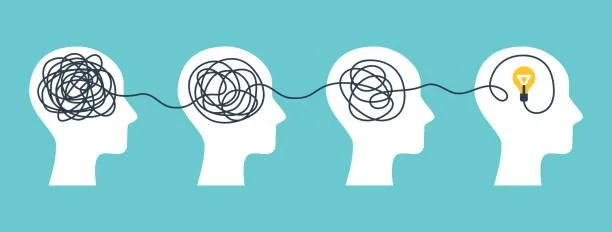
You can live a life UNTANGLED…
Therapy In-Person in Flower Mound, Highland Village, Lewisville, TX and surrounding DFW area. Virtual Therapy Also Available.
You’re not alone…we can make sense of it together….
Many of us struggle with emotional or behavioral patterns (clinically referred to as ‘symptoms’) that don’t seem to make sense on the surface—they feel “too much” or “out of proportion.” These aren’t random and it doesn’t mean that you are broken. They can be adaptive ‘protective’ strategies that have helped you cope with experiences that were considered ‘too much, too long, or too soon’. When we go through something painful or overwhelming, our brain stores not just the memory, but the emotional meaning tied to it (like “I’m not safe” or “I’m not good enough”). These emotional learnings (often out of our conscious awareness) can stay active for years, showing up in relational discord, perfectionism, performance-based worth, apathy and isolation, chronic illness, compulsivity or other forms of psychological distress.
Or perhaps you have experienced a significant traumatic event like physical or sexual assault, natural disaster, war/combat, crisis, serious accident, sudden death of a loved one? These symptoms can be more obvious like flashbacks, sleep disturbances/nightmares, panic attacks, hyper-vigilance, avoidance of people/places, depression, anxiety, etc.
The good news? Not only is your brain wired for protection, your brain can also be rewired for healing.
Let’s go beyond traditional talk therapy here. Utilizing EMDR and Coherence Therapy, we can work with our brain and body’s natural capacity to reprocess emotional experiences and rewire for safety, connection, and freedom.
Understand why you feel the way you do (even if it doesn’t make sense on the surface)
Access and shift deep emotional patterns—not just manage symptoms
In a safe and understanding therapeutic relationship, reprocess painful memories and beliefs so they no longer define your present
NOTE: Only accepting adult clients at this time, Age 18+.
Melissa Jacobson, LPC-Associate
I’m glad you’re here… and I look forward to walking this journey with you.
A little bit about me…I’m a therapist, a wife, and a mom of two boys—and like many of my clients, I’ve lived through my own seasons of struggle, healing, and growth. I am passionate in the work that I do because I believe in it… Around the age of 40, I suffered my first of many panic attacks that brought me into the office of an EMDR therapist. This began my own transformational journey of overcoming childhood attachment wounds, reprocessing traumatic experiences, and resolving my body’s threat response - no more panic attacks.
Over the years, I’ve come to deeply value both the science of the brain and the art of connection —how our brain protects us from the realities of life and how relationships (both personal and clinical) can help us heal from those deep emotional wounds that we have experienced along the way.
My approach is grounded, compassionate, and collaborative. For those who are seeking Christian counseling, I am comfortable and competent in incorporating Biblical concepts and spiritual components into therapy. I believe therapy isn’t about fixing you—it’s about helping you untangle what’s been contributing to your undesired current state of being so that you can live the life you were truly made for.
Melissa Jacobson is a Licensed Professional Counselor Associate in the state of Texas.
Supervised by Angelia Hirsch, LPC-S
Depression
Depression is more than just feeling sad—it’s a deep emotional weight that can make it hard to feel joy, motivation, or connection.
It can show up as:
Feeling numb, hopeless, or emotionally drained
Loss of interest in things you used to enjoy
Constant fatigue or low energy
Negative self-talk or guilt
Difficulty concentrating, sleeping, or getting through the day
Depression can feel isolating—but it’s not a personal failure. Often, it’s a response to overwhelming stress, loss, trauma, or long-standing emotional patterns that haven’t had space to heal.
Anxiety
Anxiety is the feeling of worry, fear, or unease that shows up when your mind and body sense something is a threat —even if you’re not in immediate danger.
It can look like:
Racing thoughts or overthinking
A constant sense of dread or tension
Trouble sleeping or relaxing
Physical symptoms like a tight chest, rapid heartbeat, or nausea
Avoiding situations that feel overwhelming
Anxiety isn’t just “in your head”—it’s your nervous system trying to protect you. But when it gets stuck in overdrive, it can make everyday life feel exhausting.
Trauma
Trauma isn’t defined just by how “big” or obvious an event was—but by how it overwhelmed your nervous system. When a traumatic or overwhelming experience isn’t fully processed, the brain stores it in a raw, unprocessed form—along with the emotions, beliefs, and body sensations that came with it. You might “move on” intellectually, but part of you stays stuck in that moment.
This can lead to symptoms like:
Flashbacks or intrusive memories
Feeling constantly on edge or easily startled
Nightmares or trouble sleeping
Emotional numbness or disconnection
Avoiding reminders of the event
Strong feelings of shame, guilt, or fear
Your nervous system is doing its best to protect you. But when those protective responses don’t turn off, they can interfere with daily life, relationships, and your sense of self.
Low Self-Esteem/Self Hatred
Low self-esteem means struggling to feel good enough—no matter how much you achieve, give, or try. It often shows up as:
Constant self-criticism or doubt
Feeling like a burden or imposter
Difficulty accepting praise or love
Believing others are more deserving than you
Always putting others’ needs ahead of your own
These beliefs often start early—shaped by how we were treated, spoken to, or made to feel in relationships. Over time, they become internal messages that quietly shape how we live, connect, and see ourselves.
Grief
Grief is the natural—and often painful—response to losing someone or something meaningful. While we often think of grief after the death of a loved one, it can also arise after the loss of a relationship, identity, health, a dream, or a sense of safety.
Grief can show up as:
Waves of sadness, numbness, or anger
Difficulty concentrating or functioning
Guilt, regret, or questions without answers
Feeling lost, disconnected, or unlike yourself
Longing for what was, or what could have been
There’s no “right” way to grieve, and no timeline. It’s a deeply personal process—one that can feel isolating, confusing, and overwhelming.
Relational/Attachment Issues
Relational/attachment issues can arise when patterns of disconnection, conflict, or unmet needs create tension between you and the people you care about—whether in romantic relationships, family, or friendships.
Common signs include:
Not feeling safe to express your emotions or ask for help
Deep feelings of shame, insecurity, fear of abandonment, or emotional disconnection.
Fear of intimacy or abandonment
Difficulty setting boundaries or expressing needs
Feeling unseen, unheard, or emotionally alone
These challenges often stem from early attachment patterns, past wounds, or unspoken beliefs about love and safety.
Specialty Areas…
Therapeutic Approaches…
What Is EMDR Therapy?
EMDR (Eye Movement Desensitization and Reprocessing) is a powerful, research-backed psychotherapy approach designed to help people heal from trauma and distressing life experiences.
When something overwhelming or traumatic happens, your brain sometimes can’t process it the way it normally would. The experience can get "stuck" in your nervous system, frozen in time. That’s why you might still react as if the danger is happening now—whether it’s through flashbacks, anxiety, panic, or negative self-beliefs.
EMDR helps your brain untangle these memories and reprocess them in a safe, supported way.
During EMDR, you'll bring to mind a specific memory or issue while engaging in bilateral stimulation—usually side-to-side eye movements, tapping, or sounds. This process helps your brain naturally reprocess the experience, so it loses its emotional charge.
Many people benefit from EMDR even if they haven’t experienced a major trauma. It’s also effective for the more subtle, chronic wounds we carry—like feeling not good enough, emotionally unsafe, or deeply alone.
What Is Coherence Therapy?
Unlike therapies that focus primarily on managing or coping with symptoms, Coherence Therapy helps you get to the underlying emotional learning that’s causing those symptoms in the first place—and then guides you through a process to untangle them for good.
It’s based on a powerful idea that symptoms can make sense when you discover what they’re protecting or expressing at a deeper emotional level. They represent adaptive responses your mind formed to protect you in earlier situations, but are no longer helpful and may be contributing to an undesired state of being.
Coherence Therapy gently brings these internal beliefs into the conscious awareness, so they can be seen, felt, and—most importantly—transformed. Curiosity and compassion will lead the way.
Services Offered…
Although not required, a 90-minute session is ideal for EMDR therapy. The extra time allows for you to share current experiences (challenges as well as successes) and take full advantage of EMDR.
A 90-minute session is also recommended for initial intake sessions: gives us time to get to know each other and begin therapy.
Couples therapy works best when there’s enough time to go beyond surface-level conflict and explore the deeper patterns underneath. Shorter sessions can feel rushed—especially when emotions are high or past wounds are being activated. The extended time allows us to do meaningful work with both of you as individuals and as a couple, without having to choose one over the other.






